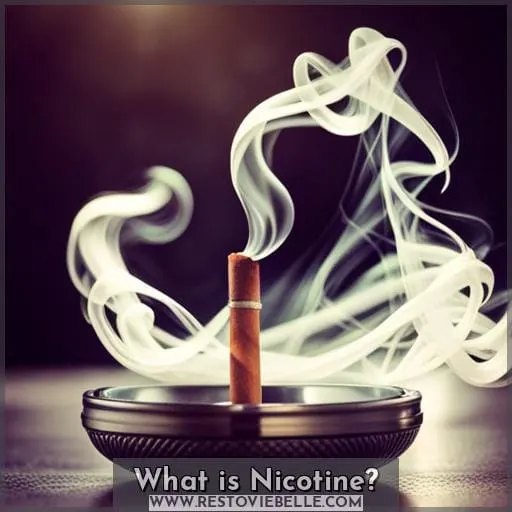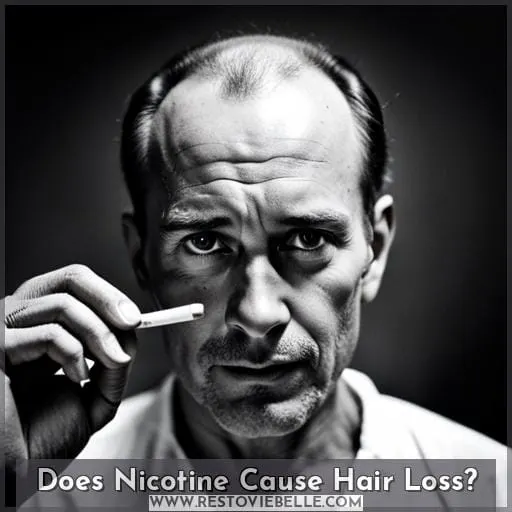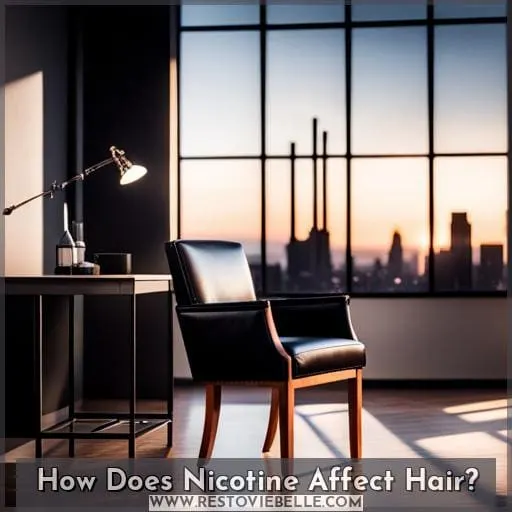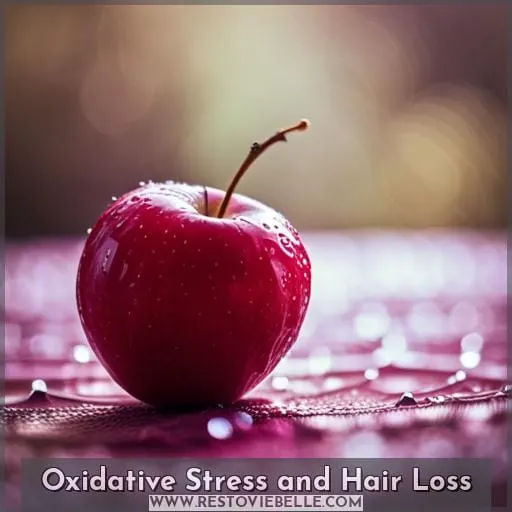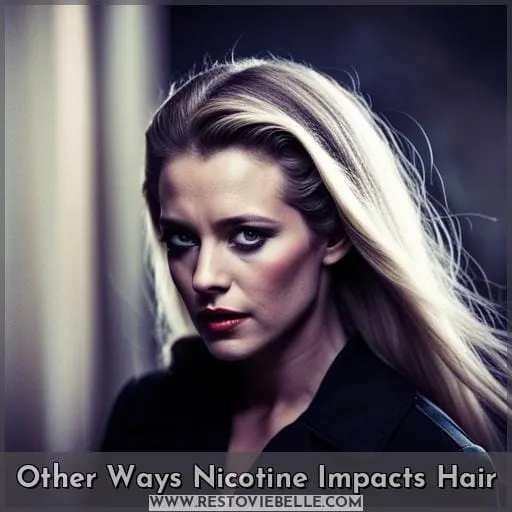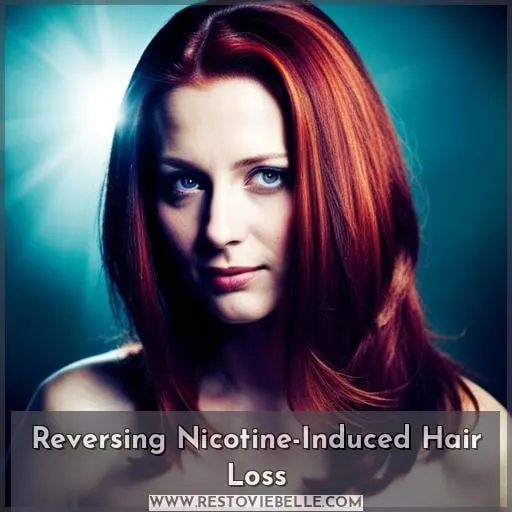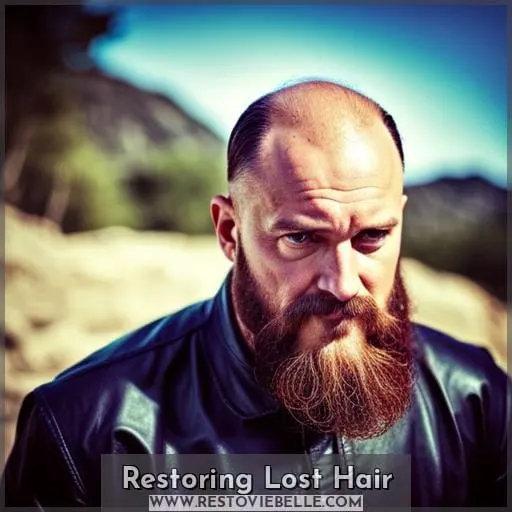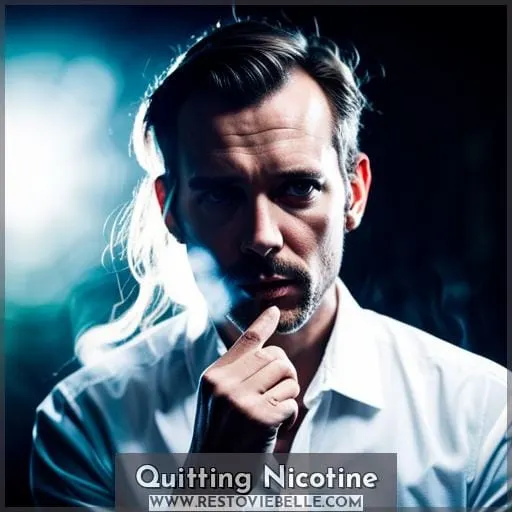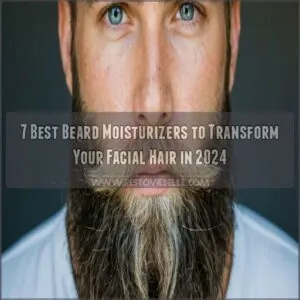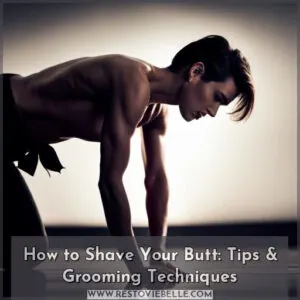This site is supported by our readers. We may earn a commission, at no cost to you, if you purchase through links.
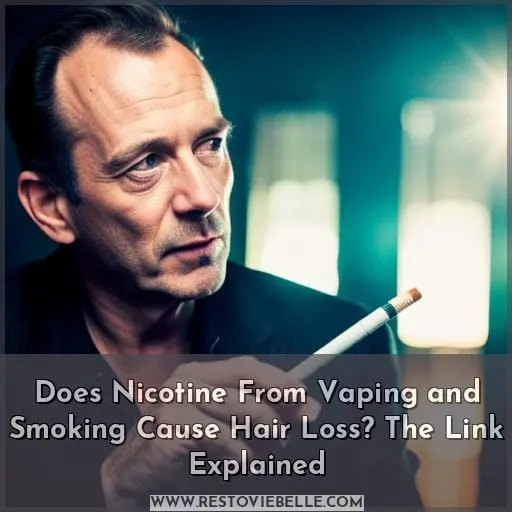 You’ve likely heard that smoking causes cancer and heart disease. But did you know it could also lead to hair loss? This troubling issue affects many smokers who enjoy lighting up cigarettes, cigars or vapes.
You’ve likely heard that smoking causes cancer and heart disease. But did you know it could also lead to hair loss? This troubling issue affects many smokers who enjoy lighting up cigarettes, cigars or vapes.
Recent research indicates the nicotine in tobacco constricts blood vessels, limiting blood flow to hair follicles. Over time, those delicate, oxygen-starved follicles get damaged and stop growing healthy strands.
So if you’re a smoker experiencing increasing hair shedding or thinning, nicotine may be to blame. The good news is that for many people, kicking the habit allows their hair to recover. Within just a few months, most former smokers begin to regrow a lush, full head of hair.
The takeaway? Your hair wants you to quit — for its sake and yours.
Table Of Contents
Key Takeaways
- Nicotine constricts blood vessels, reducing blood flow to hair follicles, which can lead to hair loss.
- Nicotine exposure increases inflammation and oxidative stress, damaging hair follicles.
- Nicotine may shorten the anagen growth phase of hair follicles, reducing hair thickness.
- Increased testosterone from nicotine use contributes to thinning hair.
What is Nicotine?
Nicotine can make those lovely locks fall out. When tobacco products are consumed, nicotine reaches all parts of the human body, including the scalp. This addictive drug promotes vasoconstriction, limiting blood flow that brings oxygen and nutrients to hair follicles.
Over time, compromised circulation leads to decreased hair strength and accelerated thinning. While genetics and hormones contribute, nicotine may hasten hair loss through these vasoconstrictive effects.
By quitting smoking and avoiding nicotine, circulation is supported and the scalp nourished. With improved blood flow, hair follicles receive vital nourishment to bolster thickness and luster. You can protect your crowning glory by ending nicotine dependence. A healthy head of hair begins from within.
Does Nicotine Cause Hair Loss?
Research strongly suggests that nicotine intake can provoke and accelerate hair loss. A wealth of investigations indicates substantial links between smoking and thinning hair, while emerging studies are uncovering possible mechanisms between vaping nicotine and alopecia as well.
Vaping and Hair Loss
My friend, some studies link the ingredients in those vapes to increased hair shedding. Vaping may starve your hair of oxygen and nutrients. Nicotine constricts blood vessels, impairing blood flow to your follicles.
While debate continues on smoking’s role, vaping’s chemical mix may similarly damage hair growth.
Smoking and Hair Loss
Have you ever wondered if those cigarettes could be making your hair thinner? Smoking can substantially elevate your risk of premature hair loss. The nicotine can constrict blood vessels that supply your hair follicles. Without sufficient blood flow, the follicles get deprived of nutrients and can’t function properly.
Over time, this continuous damage from smoking can severely inhibit hair growth and health. Ultimately, quitting is the best thing you can do for the well-being of your hair and your circulatory system.
How Does Nicotine Affect Hair?
Slowly that once lush mane thins, as nicotine silently suffocates each precious strand.
Nicotine impacts hair in various ways:
- It constricts blood vessels, reducing blood flow and nutrients to hair follicles.
- It may interfere with normal follicle cycling and growth phases.
- It can impair collagen production needed for strong, healthy hair.
- It creates inflammation and free radical damage.
Nicotine enters the bloodstream and can accumulate in hair follicles, directly impacting their function and growth potential. Over time, nicotine exposure causes progressive miniaturization and decline in the number and quality of hairs.
For those longing for their former glory, hope lies in removing nicotine’s grip. Though the damage may run deep, the body has the potential to heal when supported with care.
Oxidative Stress and Hair Loss
You’re causing inflammatory damage to your follicles by vaping nicotine. The toxic chemicals in nicotine cause oxidative stress that damages hair follicles and contributes to hair loss. The more nicotine you inhale, the more oxidative damage builds up in your follicles, disrupting the hair growth cycle.
This chemical assault creates inflammation in hair follicles that can become permanent.
Focus on quitting to remove this oxidative assault from your body. Support healthy hair by reducing sources of oxidative damage. Your follicles need a calm, nourishing environment to thrive. We must care holistically for our whole body.
Together we can overcome addiction by replacing unhealthy habits with life-giving connections and joy.
Reduced Blood Flow and Hair Loss
You’ve likely heard that nicotine can reduce blood flow to hair follicles, which hampers growth and triggers shedding.
- It constricts blood vessels, limiting nutrients and oxygen to follicles.
- It can increase plaque buildup inside vessels, blocking blood flow.
- It impacts production of growth factors relied on for healthy follicles.
With less blood circulation, follicles struggle to receive what they need to thrive. Over time, this persistent lack of nutrients causes the follicles to shrink and stop producing hair. The impact builds, gradually leading to thinning and hair loss. By quitting nicotine and improving cardiovascular health, you can enhance blood flow and circulation to give follicles their best chance at regaining vigor.
With proper care, it may be possible to restore your hair’s health and fullness.
Other Ways Nicotine Impacts Hair
You’re right to worry about nicotine’s impact on your hair health. While reduced blood flow is one major way nicotine harms hair, it also directly affects hair follicles and their growth cycles. Nicotine can shorten the anagen, or growing phase, of your hair follicles. This means hairs don’t have enough time to reach their full length before shedding.
The good news is there are solutions available, like platelet rich plasma injections to stimulate growth, that can combat nicotine-related hair thinning. Focusing on restoring blood flow and mitigating nicotine’s effects at the follicle level is key.
With counseling to help you quit smoking plus proven hair restoration techniques, your hair will be back to its thick, healthy best in no time.
Reversing Nicotine-Induced Hair Loss
Quitting vaping and getting nicotine replacement therapy can help reverse that thinning mane of yours. The good news is that for many, hair loss caused by nicotine is reversible. By quitting vaping and nicotine intake, blood flow and nutrients to the scalp and hair follicles can improve.
This allows damaged follicles to heal and regrow new, healthy hair. Treatments like over-the-counter minoxidil, prescription finasteride, and red light therapy may also boost regrowth.
Restoring your hair after nicotine damage requires patience and consistency with proven treatments. But with time, those wispy patches can fill back in. So take heart – with the right care, you can undo what vaping did and regain a head of lush, beautiful hair once more.
Restoring Lost Hair
There are innovative technologies like robotic hair restoration that can help restore your hair. Hair transplant procedures using robotic technology like the ARTAS system can precisely extract hair follicles for transplantation.
This state-of-the-art robotic system can help with transplanting hair to thinning or balding areas of your scalp for natural-looking regrowth.
Other options like PRP injections may stimulate dormant follicles to regrow hair. Or low-level laser devices could improve hair density. With proven solutions available from hair restoration experts, you don’t have to live with thinning hair caused by nicotine intake.
Seek professional help to learn about alternative therapies and technology that can renew your hair. With perseverance and the right treatment plan, you can achieve revitalized, fuller hair.
Quitting Nicotine
Let’s free yourself from nicotine’s grip once and for all. Nicotine cessation is crucial for regrowing a healthy scalp and halting hair loss. Withdrawal symptoms can be challenging but are temporary. Helpful tools include nicotine replacement therapies like patches and gum to wean off dependence.
Prescription medications ease cravings and irritability too. Quitting cold turkey takes grit but provides quick freedom from nicotine. Build healthy habits to replace smoking ones. Lean on loved ones, avoid triggers, get counseling if needed.
With time, cigarette cravings fade as your body heals. Stay focused on renewed hair growth and vibrancy that awaits you nicotine-free. Freedom from addiction is a powerful motivator during this transitional period. Trust the process and be patient but persistent in quitting for good.
Conclusion
You have the power to stop nicotine’s destruction. With every inhale of toxic vapor, your locks wither, follicles suffocate. But the choice remains yours; your fate is not sealed. By rejecting vices that betray your body, you cultivate renewal.
Where brittle strands once clung to life, vigorous tresses shall sprout, nourished by your resolve. Though the path requires courage, take heart; you need not walk it alone. Let our expertise guide your recovery, restoring the radiance nicotine once diminished.
Your healthy hair awaits, but the first step is yours. Now is the time for change.

